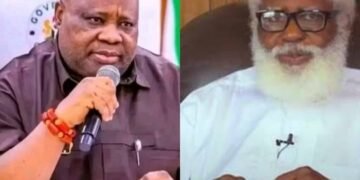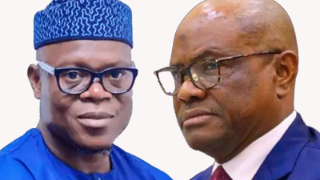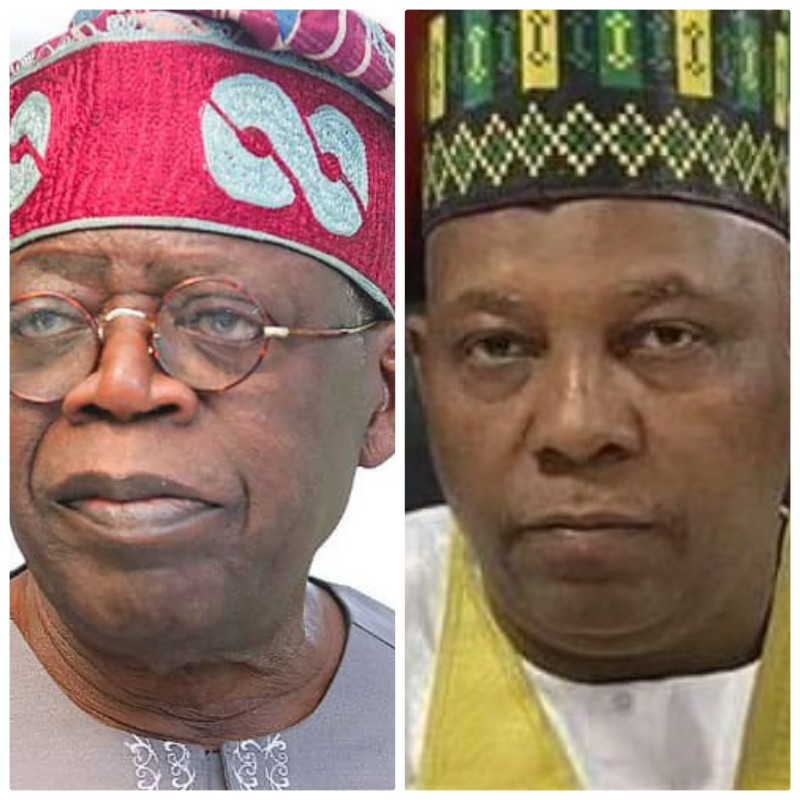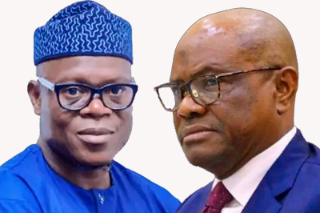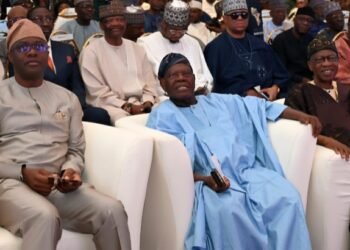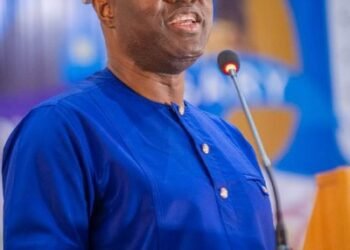The All Progressives Congress (APC) presidential candidate in the 2023 elections, Senator Bola Ahmed Tinubu, during a Sallah visit to President Muhammadu Buhari in Daura, Katsina State, today, announced Kashim Shettima, a serving senator from Borno State, as his running mate for the 2023 elections.
The announcement by the Emi Lokan presidential candidate has effectively brought to an end weeks of speculations over who would eventually be picked as the deputy presidential flag-bearer of the ruling party, ahead the elections.
While the entire Nigerian populace, especially the electorate, await the possible outcome of the choice of Senator Shettima as the APC vice presidential candidate, unveiling the man would not be out of place.
Kashim Ibrahim Shettima, formerly a governor of Borno State in the North-East and currently a senator of the Federal Republic of Nigeria, was born in Maiduguri on 2 September, 1966 to the family of Sir Kashim Ibrahim. He is married to Nana Shettima and they have three children: two females and a male.
As record reveals, Senator Kashim Shettima is a very intelligent and outspoken politician from the Kanuri tribe. He is generally seen as extremely hospitable to other faith and ethnic groups.
A detribalised Nigerian in all senses, during his time as a governor, Shettima had among his closest aides, an Ibo Christian from Anambra State in the South-East; an Urhobo Christian from Delta State in the South-South; a Christian from Edo State in the South-South; a Yoruba Christian from the South-West; a Fulani from Gombe in the North-East and a Hausa from Zamfara State in the North-West.
Education
Senator Shettima attended Lamisula Primary School, Maiduguri from 1972 to 1978; Government Community Secondary School, Biu in southern part of Borno State from 1978 to 1980; transferred to Government Science Secondary School, Potiskum (now in neighbouring Yobe State) where he completed his secondary education in 1983.
Shettima studied at the University of Maiduguri and earned a Degree (BSc) in Agricultural Economics in 1989. He had his mandatory one-year membership of the National Youths Service Corps (NYSC) at the defunct Nigerian Agricultural Cooperative Bank, Calabar, capital of Cross River State, from 1989 to 1990.
The APC vice presidential candidate obtained a master’s degree (MSc) in Agricultural Economics in 1991 at the University of Ibadan in South-West, Nigeria and joined the University of Maiduguri as a lecturer with the Department of Agricultural Economics. He was in the academia from 1991 to 1993.
Early career
In 1993, he moved into the banking sector and was employed by (now defunct) Commercial Bank of Africa Limited as Head of Accounts Unit at the bank’s office in Ikeja, Lagos State, South-West, Nigeria. He was there from 1993 to 1997.
Shettima, in 1997, crossed over to African International Bank Limited as a Deputy Manager and rose to become a Manager in 2001. In 2001, he moved to Zenith Bank as Head of its main branch in Maiduguri.
At Zenith Bank, he rose to the ranks of Senior Manager/Branch Head; Assistant General Manager (AGM)/Zonal Head (North-East), Deputy General Manager/Zonal Head (North-East) before he stepped out as a General Manager in 2007, following his appointment as Commissioner for Finance in Borno State.
Shettima worked with the Commercial Bank of Africa as an Agricultural Economist at its Ikeja Office, Lagos State (1993-1997). He then became a deputy manager, later manager, at the African International Bank Limited, Kaduna Branch (1997–2001).
He was appointed Deputy Manager/Branch Head of the Zenith Bank’s Maiduguri Office in 2001, becoming General Manager five years later.
In mid-2007, Shettima was appointed Commissioner of the Borno State Ministry of Finance and Economic Development. Later he became Commissioner in the Ministries of Local Governments and Chieftaincy Affairs, Education, Agriculture and later Health under his predecessor as Borno State governor, Senator Ali Modu Sheriff.
Political career
From 2007 to 2011, Senator Shettima served as Commissioner in five ministries. In the January 2011 ANPP primaries, Engineer Modu Fannami Gubio was selected as candidate for the governorship. However, Gubio was later shot dead by gunmen and Shettima was selected in a second primary in February 2011.
In the 26 April 2011 elections, Shettima won with 531,147 votes, while the People’s Democratic Party (PDP) candidate, Muhammed Goni, gained 450,140 votes.
He was Commissioner of Local Governments and Chieftaincy Affairs (2008), Education (2009), Agriculture and Natural Resources and finally Ministry of Health from where he contested the governorship in 2011 which he won on the platform of the now defunct All Nigeria Peoples Party (ANPP) and was inaugurated on May 29, 2011.
He won re-election in 2015 under the All Progressives Congress (APC) and was unambiguously chosen as Chairman of the Northern States Governors’ Forum, an umbrella body of Governors in the 19 states located in northern Nigeria.
Senator Kashim Shettima has so far been driving key changes in the affairs of the forum with focus on promoting northern unity and reviving ailing industries belonging to northern states.
As the governor of Borno State, he has efficiently managed challenges arising from the Boko Haram insurgency which he inherited in 2011.
With the approval of the National Security Adviser (NSA) and the Nigerian Army in 2013, his government formalized the establishment of youth volunteers called the Civilian JTF. The volunteers have played very significant role in supporting the military in ongoing fight against Boko Haram insurgents.
Shettima, as governor, approved salaries, kits and patrol vehicles for the Civilian JTF, while at the same time giving so much support to the Nigerian Armed Forces.
Shettima leads in mobilization of community-based intelligence gathering and the provision of hundreds of patrol vehicles and material logistics to the military in particular and to all other security agencies.
In September, 2014, Maiduguri, the seat of government, became very vulnerable to being occupied by insurgents. The fear was so intense that notable residents relocated their families to Abuja.
However, amid such fright, Governor Kashim Shettima, who was out of the country for an official assignment, returned to Maiduguri in a show of courage and patriotism. On his return, the governor mobilized residents towards rising up in defense of their ancestry.
Although Maiduguri didn’t fall, the insurgents succeeded in occupying 20 out of the 27 local government areas of the state before the Nigerian Armed Forces liberated them between 2015 and 2016.
Shettima coordinated and lead the temporary accommodation, rehabilitation and resettlement of victims of the Boko Haram insurgents. With peace building, Kashim Shettima, as governor, championed Reconstruction, Rehabilitation and Resettlement (RRR) of victims.
Shettima focused so much attention on expansion and remodeling of existing schools and the building of new boarding primary and junior secondary schools to cater for over 50, 000 unaccompanied orphans whose parents were killed by insurgents across the 27 local government areas of the state.
Governor Kashim Shettima’s leadership credentials attracted positive recognition within and outside Nigeria. He emerged the 2014 Governor of the Year (Leadership Newspapers); Governor of the Year, 2015, (Nigeria Union of Journalists, national body); Governor of the Year, 2015 (NewsWatchTimes Newspapers); Governor of the Year, 2015 (Vanguard Newspapers); Governor of the Year, 2016 (Tell Magazine); 2017 Zik Prize for Leadership; Kaduna NUJ Award for Courage and Exceptional Leadership (2017); FCT NUJ Merit Award for Exceptional Leadership, 2017.
In February, 2019, Senator Kashima Shettima became the winner of the Borno Central Senatorial District election, thereby replacing replacing Senator Babakaka Bashir.
The senatorial district comprises right local government areas, including Maiduguri, Jere, Konduga, Bama, Mafa, Dikwa, Ngala and Kala Balge.
Source: Wikipedia.




